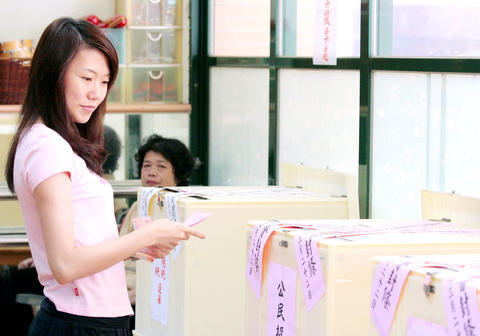The nation's fifth and sixth referendums, both of which turned to the question of whether the nation should apply to join the UN, received a double rejection yesterday, with a turnout of about 35 percent, demonstrating that so far the nation has been unable to reach a consensus on the matter.
The referendums took place yesterday alongside the presidential election.
While the Democratic Progressive Party (DPP) had proposed a referendum on joining the UN using the name "Taiwan," the Chinese Nationalist Party (KMT) initiated its own, asking the nation whether it should seek to "rejoin" the international body using the name "Republic of China" or any other "practical" title that would uphold the country's dignity.

PHOTO: CHAN CHAO-YANG, TAIPEI TIMES
The Referendum Law (
First, more than 50 percent of eligible voters need to cast a referendum ballot, and second, of the valid votes, 50 percent of the voters need to respond in the affirmative to the referendum question.
None of the six referendums held in the nation so far has managed to reach the first benchmark and attain the 50 percent threshold.
By law a failed referendum question cannot be asked again for a period of three years.
Central Elections Commission statistics showed that 17,313,854 voters were eligible to participate in the referendum, meaning that 8,656,927 voters needed to pick up a ballot.
With invalid or forfeited votes taken into account, the number of votes estimated by the commission for a referendum to pass was about 4.3 million if the 8.65 million threshold was met.
In the fifth referendum, the DPP asked: "In 1971, the People's Republic of China joined the United Nations, replacing the Republic of China and making Taiwan an international orphan. Do you agree that the government, in a strong expression of the will of the Taiwanese people and in order to elevate Taiwan's international status and promote its international participation, should join the United Nations under the name `Taiwan'?"
The referendum received 6,201,677 votes -- a 35.82 percent turnout -- 5,529,230 of which were in the affirmative, or 94.01 percent of the valid votes.
In its referendum, the KMT asked the voters: "Do you agree that our country should apply to return to the United Nations and enter other organizations using a pragmatic and flexible name strategy, that is, do you approve applying to return to the United Nations and joining other international organizations under the name the `Republic of China,' `Taiwan' or another name that facilitates success while maintaining dignity?"
The referendum received a total of 6,187,118 votes -- a 35.74 percent turnout -- of which 4,962,309 were in the affirmative, or 87.27 of the valid votes.
During the legislative elections in January, referendums three and four received a 26.34 and 26.08 percent turnout respectively.
In 2004, the first and second referendums were tied with the presidential election and received 45.17 and 45.12 percent turnout respectively, the commission said yesterday.
The referendums have been a topic of fierce debate in the past months.
Prominent political figures such as President Chen Shui-bian (
For his part, KMT Chairman Wu Poh-hsiung (
Prior to the vote, the Mainland Affairs Council issued a statement condemning Chinese Premier Wen Jiabao's (溫家寶) statement that Taiwan had no right to proceed with the UN referendums because it is part of China.
Also, Wu Yu-hsueh (
The request was not seconded and the referendums were held yesterday as scheduled.

Taiwan is to commence mass production of the Tien Kung (天弓, “Sky Bow”) III, IV and V missiles by the second quarter of this year if the legislature approves the government’s NT$1.25 trillion (US$39.78 billion) special defense budget, an official said yesterday. Commenting on condition of anonymity, a defense official with knowledge of the matter said that the advanced systems are expected to provide crucial capabilities against ballistic and cruise missiles for the proposed “T-Dome,” an advanced, multi-layered air defense network. The Tien Kung III is an air defense missile with a maximum interception altitude of 35km. The Tien Kung IV and V

The disruption of 941 flights in and out of Taiwan due to China’s large-scale military exercises was no accident, but rather the result of a “quasi-blockade” used to simulate creating the air and sea routes needed for an amphibious landing, a military expert said. The disruptions occurred on Tuesday and lasted about 10 hours as China conducted live-fire drills in the Taiwan Strait. The Civil Aviation Administration (CAA) said the exercises affected 857 international flights and 84 domestic flights, affecting more than 100,000 travelers. Su Tzu-yun (蘇紫雲), a research fellow at the government-sponsored Institute for National Defense and Security Research, said the air

Taiwan lacks effective and cost-efficient armaments to intercept rockets, making the planned “T-Dome” interception system necessary, two experts said on Tuesday. The concerns were raised after China’s military fired two waves of rockets during live-fire drills around Taiwan on Tuesday, part of two-day exercises code-named “Justice Mission 2025.” The first wave involved 17 rockets launched at 9am from Pingtan in China’s Fujian Province, according to Lieutenant General Hsieh Jih-sheng (謝日升) of the Office of the Deputy Chief of the General Staff for Intelligence at the Ministry of National Defense. Those rockets landed 70 nautical miles (129.6km) northeast of Keelung without flying over Taiwan,

A strong continental cold air mass is to bring pollutants to Taiwan from tomorrow, the Ministry of Environment said today, as it issued an “orange” air quality alert for most of the country. All of Taiwan except for Hualien and Taitung counties is to be under an “orange” air quality alert tomorrow, indicating air quality that is unhealthy for sensitive groups. In China, areas from Shandong to Shanghai have been enveloped in haze since Saturday, the ministry said in a news release. Yesterday, hourly concentrations of PM2.5 in these areas ranged from 65 to 160 micrograms per cubic meter (mg/m³), and pollutants were